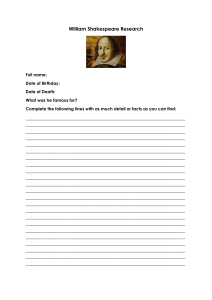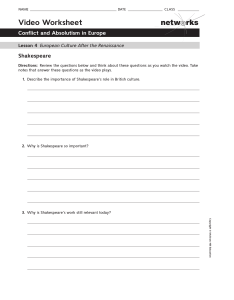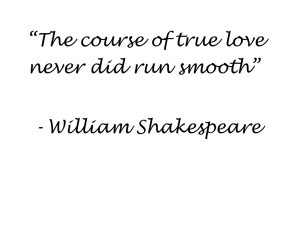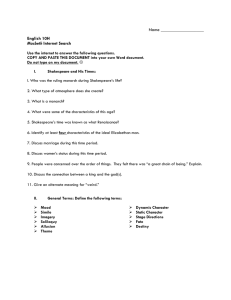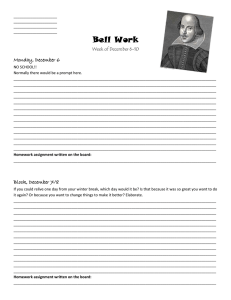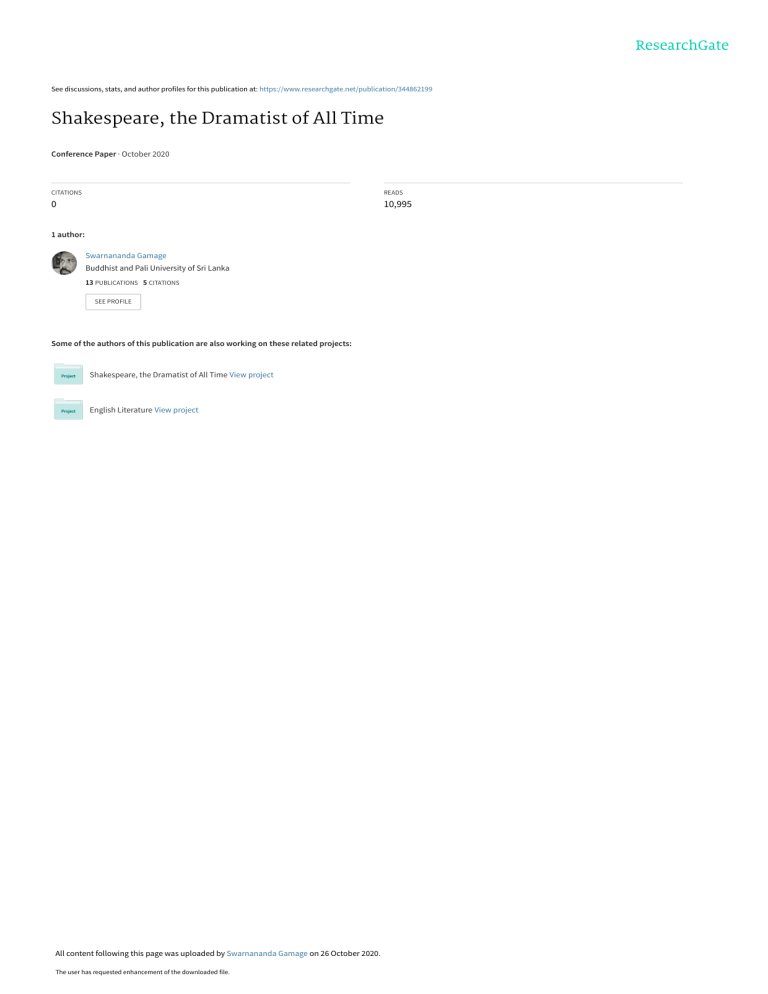
See discussions, stats, and author profiles for this publication at: https://www.researchgate.net/publication/344862199 Shakespeare, the Dramatist of All Time Conference Paper · October 2020 CITATIONS READS 0 10,995 1 author: Swarnananda Gamage Buddhist and Pali University of Sri Lanka 13 PUBLICATIONS 5 CITATIONS SEE PROFILE Some of the authors of this publication are also working on these related projects: Shakespeare, the Dramatist of All Time View project English Literature View project All content following this page was uploaded by Swarnananda Gamage on 26 October 2020. The user has requested enhancement of the downloaded file. Shakespeare, the Dramatist of All Time Introduction Ben Jonson, Shakespeare’s well known contemporary playwright, poet and actor calls Shakespeare “not of an age but for all time.” Shakespeare therefore is the dramatist for all seasons and arguably the most timeless and placeless dramatist, the world of literature has ever produced. He produced 37 plays during his time and penned 154 sonnets with two epic poems. Shakespeare is the mostly quoted (person) next to the Bible and his works have been produced in almost all languages with diverse sort of modifications; his characters have continued to be not just theatrical realities but social realities over four centuries as the characters like Romeo, Juliet, Hamlet, Othello, Macbeth, Julius Cesar, Shylock etc. are still very much alive irrespective of socio- cultural, political and geographical differences. Thus, Ben Jonson further adds in a familiar tribute to Shakespeare: “Thon art alive still while thy Booke doth live, and we have wits to read, and praise to give” Birth and Parents William Shakespeare was born in Stratford on Avon and baptized on April 26, 1564. Although the exact date of his birthday is unknown, it is traditionally celebrated on April 23. The eldest son and first surviving child of John Shakespeare and his wife, Mary Arden, he had three brothers and two sisters. His father, a tenant farmer’s son, was a glove maker who through hard work became a landowner, a Justice of Peace, high bailiff (the town’s highest political officer), and a gentleman with a coat of arms. His mother was a member of the gentry from Wilmcote. In about 1578 John Shakespeare’s fortunes began to decline; he ran into debt and was forced to sell some property. Nevertheless, he was an important Stratford citizen, and Shakespeare passed his youth as the son of one of the leading families of a prosperous market town. Education Although there is no supporting evidence, it seems likely that Shakespeare attended a “petty” school at the age of five and, at seven, entered the Stratford Grammar School, which according to contemporary accounts provided an education as good as any in England. The curriculum was heavily classical, concentrating on the Latin language and its literature and possibly including some Greek. Ben Jonson’s statement that Shakespeare had “small Latin and less Greek” has been seized upon by those who wish to prove that Shakespeare had little formal education, pointing also to fact that he did not attend a university. Shakespeare was at least as literate as most of his contemporaries. Jonson’s statement was not an attempt to belittle Shakespeare’s achievement, as in the same way he compared Shakespeare to Aeschylus, Euripides, and Sophocles. Marriage and Children In 1582, at the age of eighteen, when his father was having financial difficulties, William Shakespeare married the twenty eight years old Anne Hathaway, who came from a modest land-owning family. Their daughter Susanna was baptized on May 26, 1583, six months after the marriage. Shakespeare’s two other children, the twins Hamnet and Judith were christened on February2,1585. Page 1 of 11 Lost Years The seven years between 1585 and 1592 have been called “the lost years” for there are no records of Shakespeare’s activities after the twins’ christening in 1585 and his employment during the lost years is a matter for speculation. A suggestion that he was a soldier seems to be based on confusion about a man with a similar name; a man called William Shakeshafte (the names are so similar that some argue that they may have referred to the same man) was a provincial actor; and a late contemporary, William Beeston, states that Shakespeare was a schoolmaster. Just as little is known of Shakespeare’s private life during these lost years, it is almost certain that his wife and children remained in Stratford, and it has been suggested that since his wife’s father and brother received Puritan funerals, she too was a Puritan and disapproved of her husband’s theatrical activities. First Theatrical Activities in London Recent investigation into the dates of his plays suggests that Shakespeare left Stratford for London between 1584 and 1586 and that, by chance or by evidence of his genius, he quickly established himself there as an actor-dramatist. Some four to nine of Shakespeare’s extant plays seem to have been written by 1592. These include the three parts of Henry VI, Richard III and possibly Titus Andronicus, The Comedy of Errors, The two Gentlemen of Verona and The Taming of the Shrew. King John may also date from this early period. The Poet – Narrative Poems and Sonnets Between 1592 and 1594, when the plague closed London’s theatres, he probably composed his narrative poems, Venus and Adonis (1593) and The Rape of Lucrece (1594), both authorized for publication by Shakespeare and dedicate to Henry Wriothesley, 3d Earl of Southampton, a young, brilliant, and wealthy member of the court. Both poems were extremely popular; their success and the probable patronage of Southampton suggest that Shakespeare need not have returned to the less distinguished task of writing for the theatre unless he chose to do so. Scholars who seek information about Shakespeare as a poet, have done much research on the sonnets and on the identification of “Mr. W.H,” to whom they are dedicated. While there is no evidence that Shakespeare authorized or was in any way involved in publishing the 1609 edition of the Sonnets, a variety of attempts have been made to identify the “Fair youth” and the “Dark lady” to whom he so frequently addressed. Various critical studies suggest that the “Dark lady” was Queen Elizabeth; a courtesan called Lady Negro; the wife of an Oxford innkeeper; or Marry Fitton, the mistress of the Earl of Pembroke. It has also been suggested that the sonnets were private hymns to Shakespeare’s homosexual lover. Whatever these assumptions may be, they are conjectures, and the feelings of Shakespeare continue to remain an enigma. The Full-time Dramatist In1594 Shakespeare joined the Lord Chamberlain’s company as an actor and writer, and he remained with this troupe for at least sixteen years, in what appears to have been a harmonious and profitable artistic and business venture. The Chamberlain’s Men under the patronage of Queen Page 2 of 11 Elizabeth’s Lord Chaberlain, was headed by the actor Richard Burbage and his brother Cuthbert, the son of the actor James Burbage, who had built the Theatre, London’s first playhouse, in 1576. It was a joint stock company with ten shares, five owned by the Burbage and the rest divided among Shakespeare and four other actors. With Richard Burbage as its leading actor and Shakespeare as its principal dramatist, the company prospered, presenting a greater number of plays before Queen Elizabeth than any other London company. When it lost the lease of the land on which the Theatre stood, some of the members, including Shakespeare, formed in 1599 a syndicate to finance and build a new theatre, the Globe. In 1603, when James I became King, the Chamberlain’s Men received royal patronage and became the King’s Men, or King’s Servants, London’s leading theatrical company. In 1608 the syndicate owning the Globe took over another theatre, the Blackfriars, as well. Shakespeare appears, however, to have been truly dedicated to the theatre, for unlike most of his fellow dramatists, he wrote almost exclusively for the stage from then on, even though at that time popular drama was not considered seriously as literature. The Actor Although Shakespeare’s reputation as an actor is unknown and few of the roles he played are recorded, his name appears on the cast lists as one of the “principal comedians” of Jonson’s “Every Man in His Humour” and as one of the “principle tragedians” in Jonson’s “Sejanus His Fall.” He is reputed by an early biographer to have played Adam in “As You Like It” and the ghost in “Hamlet.” Retirement Though Shakespeare retired to his native town in 1611 or 1612, he did not completely break off his ties with London. In 1612 he was summoned to London as a witness in a lawsuit between members of a family in whose house he had lodged years before. In 1613 he took part in the tournament held on the anniversary of the King’s accession, helping Richard Burbage design the emblem of the Earl of Rutland’s shield. What became of his relationship with his acting company and how and when he disposed of his shares in it are not known. Perhaps his connection with the theatre ended when the Globe burned down in June, 1613, during a performance of his Henry VIII. From 1594 until his retirement in 1611 or 1612, Shakespeare seems to have been the most popular dramatist of his time and perhaps the most highly esteemed as well. Shakespeare did not become involved in controversies as his closest rival, the arrogant Ben Jonson did, for example, in the so called war of the theatres; he seems to have been well liked by his contemporaries, for all references to him, Emphasize his mildness, gentleness, and goodwill. Prosperous Gentleman and Death All the evidence seems to indicate that Shakespeare was careful in money matters, investing his savings wisely and cautiously so that in his later days he was a man of some substance (actors in Shakespeare’s day were well paid and even now compared to Sri Lankan standard). In 1597 he bought and paid £60 for New Place, the second largest house in Stratford, to which he later retired. He received his coat of arms and title “gentlemen” after his father’s death in 1601. (It is probable that John Shakespeare’s coat of arms, granted in 1596, had been financed by his increasingly prominent son.) Purchases of land for £320 in 1602 and for a smaller amount in 1611 made him one Page 3 of 11 of the largest landowners in the district. In 1605 he bought a lease for tithes that brought him an income of about £60 a year. In 1613 he bought a house for £140 of London, in the Blackfriars district. It appears that Shakespeare enjoyed the life of a country gentlemen in Stratford and took some part in local affairs. The nature of his relationship with his wife is not known; she is mentioned only casually in his will, where she is left “his second- best bed.” However, this does not mean that they were estranged or that she was neglected, for the law automatically provided for widows. Their son Hamnet died in 1596, and by 1613 Shakespeare’s mother, brothers, and one sister were all dead. Shakespeare’s first daughter, Susanna had married a prominent Puritan physician, John Hall, in 1607; Judith, his other daughter, married in 1616, Shakespeare died soon after, on April 23th, 1616, and was buried in Stratford. His purchase of tithes entitled him to be buried inside the chancel rail of the parish church. Theatre Experience “Electricity” and “Curtains” are two of the handiest features of the modern theatre. These two features have made the present day theatre very rich in technique and audience-friendly in numerous ways. However Shakespeare’s Elizabethan theatre lacked the luxury of “Electricity” and “Curtains” making it too difficult for the dramatists to impart their messages in the way they do today. The other most note-worthy factor is that all the female roles were played by male actors; Desdemona, Portia, Lady Macbeth, Titania, Miranda etc. are all played by male actors who were trained to play them over the years. It might be interesting to read the account of one who lived at the same time of Shakespeare, the famous Elizabethan, Sir Philip Sidney, which will show graphically the conditions with which Shakespeare had to deal at least when he first came to London. In most places the player, when he comes in must ever begin telling where he is, or else the tale will not be conceived (i.es. understood. Now you still have three ladies. i.e. boys in female attire), walk in to pluck flowers, and then we realize that the stage is a garden; by and by we hear of a shipwreck in the same place, and we know that it is a rock. Next comes a hideous monster with fire and smoke, and the miserable beholders have to know from that the stage is a cave. Meanwhile, two armies flight is represented by four swords and two shields, and the stage becomes a battlefield. Page 4 of 11 Shakespeare’s Plays Accurate dates of Shakespeare’s plays are still a matter of debate among scholars. This is a general frame of reference. Year Comedies Tragedies Elizabethan Period 1591 Henry VI, Part I 1592 Comedy of Errors Two Gentlemen of Verona 1593 Love’s Labor’s Lost Henry VI, Part II Titus Andronicus 1594 1595 1596 Richard III King John Midsummer Night’s Dream Merchant of Venice Taming of the Shrew Romeo and Juliet 1597 1598 Histories Richard II Henry IV, Part I Much Ado About Nothing Henry IV, Part II Globe Theatre was constructed 1599 As You Like It Merry Wives of Windsor Julius Caesar 1601 Twelfth Night Hamlet 1602 Troilus and Cressida All’s Well That Ends Well 1603 Jacobean period 1604 Queen Elizabeth died Measure for Measure King Lear 1606 Macbeth 1607 Timon of Athens Antony and Cleopatra Pericles 1609 1610 1611 Coriolanus Cymbeline Winter’s Tale Tempest 1613 Othello 1605 1608 Henry V Henry VIII Shakespeare’s active theatre life expands for 22 years. (from 1591 to 1613) In the period he produced 37 plays which consist of 17 comedies, 10 tragedies and 10 histories. Page 5 of 11 All Shakespeare’s tragedies and histories are entitled after the names (proper nouns) of the protagonists. Tragedy Tragedy is a play that ends sadly for the protagonist / protagonists. (The “Merchant of Venice” is a well-known comedy in which, it ends happily for protagonists like Bassanio, Antonio, Portia. However, for Shylock “The Merchant of Venice” is a tragedy; Shylock being the antagonist in the play, is not considered as a protagonist.) It is quite obvious that Shakespeare has been so much inspired by Greek Tragedy. Aristotle in his legendry masterpiece, Poetics, outlined characteristics of a tragedy. “A tragedy is the imitation of an action that is serious and also, as having magnitude, complete in itself; in appropriate and pleasurable language; in a dramatic rather than narrative form; with incidents arousing pity and fear, wherewith to accomplish a catharsis of these emotions.” Aristotle In simple elaboration, tragedy is A downfall of the hero - a man / women is supervisor to the average man in some way / a person better than we are, due to a tragic flaw or mistake (Hamartia, the Greek word) According to Aristotle a tragic hero must create both pity and fear, therefore the tragic hero must be a mixture of both good and bad rather than being merely good and perfect in manners and behaviour. Person of high standing Downfall due to tragic flaw / mistake To such a state that he/she cannot survive in the way he/she did, either he/she killed or he/ she commits suicide Almost all tragic heroes of Shakespeare: Hamlet, Macbeth, Othello, Julius Caesar, King Lear etc. are far from perfect though clever and smart personalities. It is quite evident that through the world Page 6 of 11 famous works of theatre, Shakespeare carried tragic drama to a new height; thereby tragedy achieved its maturity in Elizabethan time. Note-worthy elements of Shakespeare Tragedy Noble person / man or woman of high social standing / better than an average person who is far from perfect Tragic hero Ex: King Lear is the King in England. Othello is the most competent General in Venice. Julius Caesar is an emperor. Both Romeo and Juliet are from noble families. It is the weakness that hero possesses, of which he / she is going to suffer. It’s a character trait that leads to the downfall of the protagonist or a wrong action performed by the hero / heroine or the mistake he /she makes deliberately or otherwise, that results in his / her own ruin. Tragic flaw Ex: Othello’s Macbeth Hamlet King Lear - Jealousy and gullibility - Lust for power and taking a short cut to success. - Indecisiveness and excessive refinement - Excessive egoism and ungovernable temper. This could result in hero’s struggle with his own good and bad qualities or else the fight he / she has to undergo with the external forces like fate, evil spirits, mysterious manipulations (ex: Iago against Othello in “Othello”) These conflicts may result in either putting the protagonist into absolute puzzling situation or realization of the futility of his / her efforts and expectations. Conflict: Internal and External Ex: Hamlet questions himself Othello finally questions himself Macbeth remarks - be, or not to be: that is the question Act III, Scene I., Hamlet - And he retires. Where should Othello go? Act V Scene II - Out, out, brief candle. Life’s but a walking shadow, a poor player Act V Scene V Page 7 of 11 Almost all tragedies of Shakespeare end in either protagonist’s committing suicide or he or she is murdered in tragic circumstances. Tragic hero is fallen into such a situation that he or she is not in a position to survive any more, Downfall / The tragic end Ex: Othello commits suicide, while Macbeth and Julius Caesar are killed. One of the best examples of tragic end is the way “Othello” ends. It ends in mass bloodshed - Iago and Cassio are seriously injured. Desdemona, Emila, Rodrigo are murdered and Othello commits suicide. Diversity found is Shakespearean tragedies is a very distinct feature. Popular early tragedy, Romeo and Juliet is considered as a romantic tragedy. Some critics later argued that “Romeo and Juliet” brings a very peaceful reconciliation between the sworn enemies in the end; therefore should be categorized not as a tragedy but as a tragi-comedy. However most of the tragedies by Shakespeare fall into the category of revenge and ambition tragedies. Othello, Hamlet, King Lear and Macbeth are supposed to be dark tragedies that demonstrate revenge and ambition. These four major tragedies about which more has been written than all the other works combined, command a tremendous tragic power and explore the mysteries and fascination of evil; and all are masterpieces of dramatic literature in which tragedy is universal as well as personal. The unity of tone in each play is unique to that work; language, with its special rhythms and images, evokes thematic content. The destination of Shakespearean tragedy ultimately lies in its intensely dramatic power, its universality of theme, and its brilliance of poetry and thematically integrated imagery. Shakespeare’s most outstanding achievement, the great plays of human motivation, reflect not only his genius as a dramatist but his breadth and depth as a human being. Comedy Comedy is a light-hearted play that ends happily for the protagonist / protagonists. Comedy is most often meant to amuse the audience with a happy ending where everything is put right at the end. In most cases comedy ends with poetic justice in which the good is rewarded and the evil is punished. Shakespearean comedies on the other hand are not as simple as that because they are inevitably widely divergent, including farces, serious romances and problem satires. In tragedies, Shakespeare mostly dealt with kings, queens and noble people of high social standing but we come across down- -to earth, pretty ordinary people and people of working class in his comedies. Ex: “rude mechanicals”, “hard-handed men” in A Midsummer Night’s Dream. Note-worthy elements of Shakespeare comedy Page 8 of 11 The play is often a tale of love where young lovers struggle to triumph despite the parental and social obstacles. Ex: The Merchant of Venice A Midsummer Night’s Dream Theme of love & Romance In Midsummer Night’s Dream Shakespeare raises an awareness of most of social obstacles, lovers have to confront in their courtships, at the outset of the play “different in blood” – racial differences “too high to be enthralled to low” – difference in social status “Misgraffed in respect of years, too old to be engaged to young” – age difference “Choice of friends… Choice love by another” - difference in choice (somebody else’s choice) Shakespeare comedies are interwoven plots of twists and turns. Diversity in characterization may make messy situations as unexpected events keep occurring throughout the play. The lovers’ separation and reunion are a common phenomenon Complex plot in plot constructions. Ex: “A Midsummer Night’s Dream” is constructed on four subplots put together Mistaken Identity Happy ending / (mostly end) in Marriage It is one of the most used plot devices of Shakespeare comedies employed particularly trough the young women as gentlemen. Thus, mixed up gender identity leads to many misunderstandings and comical situation in the plays. Ex: “In twelfth Night” the twins are mistaken for each other bringing a comic conflict throughout the play. “Much Ado about Nothing” Happy ending is a common feature of Shakespeare comedy, usually involving marriages as love culminating in marriage. Some plays end in multiple marriages. Certain didactic aspect is reflected in the comedies as they promote marriage and family life. Ex: “A Midsummer Night’s Dream” and “Twelfth Night” end in three marriages. The plays such as “A Midsummer Night’s Dream”, “The Merchant of Venice”, “As you like it”, “Much Ado about Nothing”, “Twelfth Night” are regarded as romantic comedies. Their plots are characterized by incongruous or unrealistic situations, fantasy, disguises, clowns and their superb poetry. Incarnations of Shakespeare’s humor and rationality; they reflect his observations of human strengths and limitations and his consciousness of man’s constant vulnerability to his own capriciousness. Their range extends from the fantasy and farce of “A Midsummer Night Dream” to the threshold of tragedy in “The Merchant of Venice”, whose central figure is the villain Shylock. All Shakespearean comedies are not merely romantic comedies, “Measure for Measure” and “All’s Well That Ends Well” fall into the category of either problem comedies or dark comedies. Page 9 of 11 Conclusion Supreme among English dramatists, Shakespeare is probably the greatest dramatist of all time, his only possible competitors being Aeschylus, Sophocles, and Euripides. While many masters owe at least part of their reputation to their influence upon succeeding authors, Shakespeare’s greatness lies primarily in the sum total of his work, which constitutes the culmination of English Renaissance drama. Relative to his enormous stature, his influence on contemporary writers was minor, although his genius had some impact; he was grudgingly regarded by English critics and dramatists of the Restoration and eighteenth century as a wonderful and remarkable “child of nature” It was not until after 1750,150 years after his death, that Shakespeare’s work began to be a major influence upon world drama. Since then his reputation has soared: internationally, his plays have been produced more often than those of any other dramatist, and in many countries more often than plays of native dramatists, even though with the difficulty of translating his rich, idiomatic Elizabethan Language. Shakespeare’s capacity to transcend national boundaries and speech derives from his perceptive compassion for people, his ability to dramatize abstractions, his appreciation of the dramatic impact of ambiguity, and his magical language. He was, of course, influenced by his contemporaries and immediate predecessors: by Lyly’s prose; Greene’s female characterizations; Kyd’s revenge tragedy; and Marlowe’s heroic characters, style, and verse. Yet he surpassed them all. Marlowe endowed his characters with majestic and lyrics speech and introduced blank verse into dialogue. Shakespeare transformed this blank verse and varied its rhythms. The sensitivity to poetry and tremendous appetite for good or evil of Marlowe’s heroes were intensified by Shakespeare, whose characters embody poetic and sweeping passions along with for greater self-awareness; thus they become complex and credible human beings acting with realistic motives. Swarnananda Gamage (Senior Lecturer) Buddhist and Pali University of Sri Lanka References: Bradley, A.C., (2007), Shakespearean Tragedy, Introduction to the fourth Edition, PALGRAVE MACMILLAN, New York Berry, Ralph, (1972), Shakespeare’s Comedies, Explorations in Form. Princeton: Princeton University Press, New Jersey, USA Bethell, S.L., (1944), Shakespeare and the popular Drama Tradition. London: King and Staples, U.K. Coles Editorial Board, (2017), Shakespeare A Midsummer Night’s Dream, Chaman Enterprises, Pataudi House, New Delhi, India Kyle C. Grady,( 2017), Moors, Mulattos, and Post-Racial Problems: Rethinking Racialization in Early Modern England A dissertation, the degree of Doctor of Philosophy (English Language and Literature) in the University of Michigan, USA Peck, John and Coyle, Martin, (2000), A Brief History of English Literature, New York, Palgrave Page 10 of 11 Penguin Classics, (1996), William Shakespeare four Comedies, Penguin Books, London, England Page 11 of 11 View publication stats
